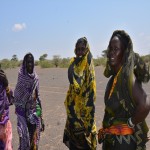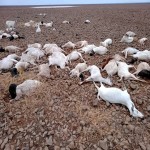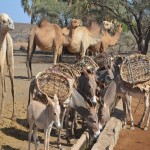
Talaso, selected as a beneficiary, sees this as a lifeline that
promises to alleviate the suffering of her community. The project aims to diversify
livelihoods and introduce alternative means of sustenance, with a focus on adopting
shade net technology for agriculture.
Optimistic about the positive impact of the intervention, Talaso eagerly anticipates a new
way of living through agriculture. However, she emphasizes the need for sustained
support until her community becomes self-sufficient in farming, acknowledging that this
is a profound shift from their accustomed pastoralist lifestyle.
In the midst of the barren desert, Talaso Isacko stands as a symbol of unwavering strength,
facing the challenges of the desert with resilience and a determination to build a better
future for her children and her community. The upcoming project, with its innovative
approach, represents not just a change in livelihoods but a promise of hope rising from
the scorched sands of El Isacko Malla.In
the midst of this unforgiving terrain resides a woman named Talaso Isacko, a mother of
seven who has emerged as the epitome of resilience in the face of adversity.
Talaso's life revolves around raising her seven children—six beautiful daughters and one
young son. However, her journey is far from
ordinary, as she navigates the challenges of
single-handedly managing a household in a
region plagued by prolonged drought, water
scarcity, and the invasion of the destructive
Juliflora tree species.
The Chalbi Desert, with its arid expanse, has
stripped away the traditional means of
sustenance for Talaso's pastoralist community. Once thriving on livestock rearing, the
changing climate has rendered this way of life unsustainable. Talaso, with no formal
education or alternative skills, found herself grappling with the stark reality of providing
for her family in the midst of adversity.
Reflecting on better days, she reminisces about a time when her livestock provided more
than just sustenance—it afforded her the ability to provide three meals a day, send her
children to school, and clothe them. However, the looming shadow of climate change has
altered the landscape of her life, leaving her struggling to put food on the table.
The hardships extend beyond the confines of her home. Water, a basic necessity for
survival, has been a source of daily toil for Talaso. The five villages in the area rely on a
single shallow well for their domestic needs. Queues would form, stretching for hours,
and sometimes an entire day, as families awaited their turn. Talaso, with her one-year-old
on her front and water vessels on her back, would embark on this challenging journey,
leaving her other children hungry in her absence.
The story takes a harrowing turn when one day, in the early hours of the morning, Talaso,
accompanied by her three donkeys and a loyal dog, encountered a formidable foe—a
hyena. Death stared her in the eyes as the wild animal attacked, claiming the life of her
loyal companion and sending the donkeys fleeing into the wilderness.


